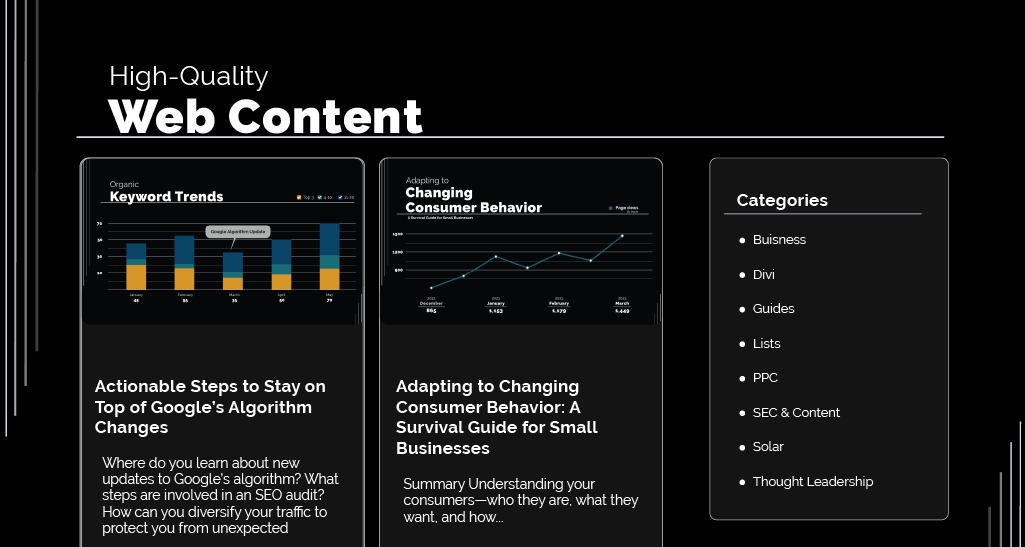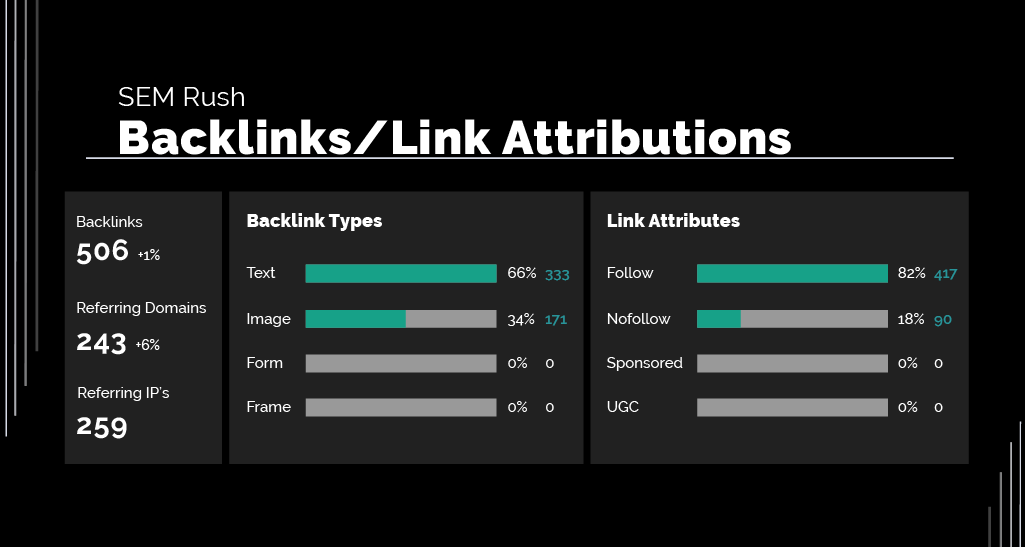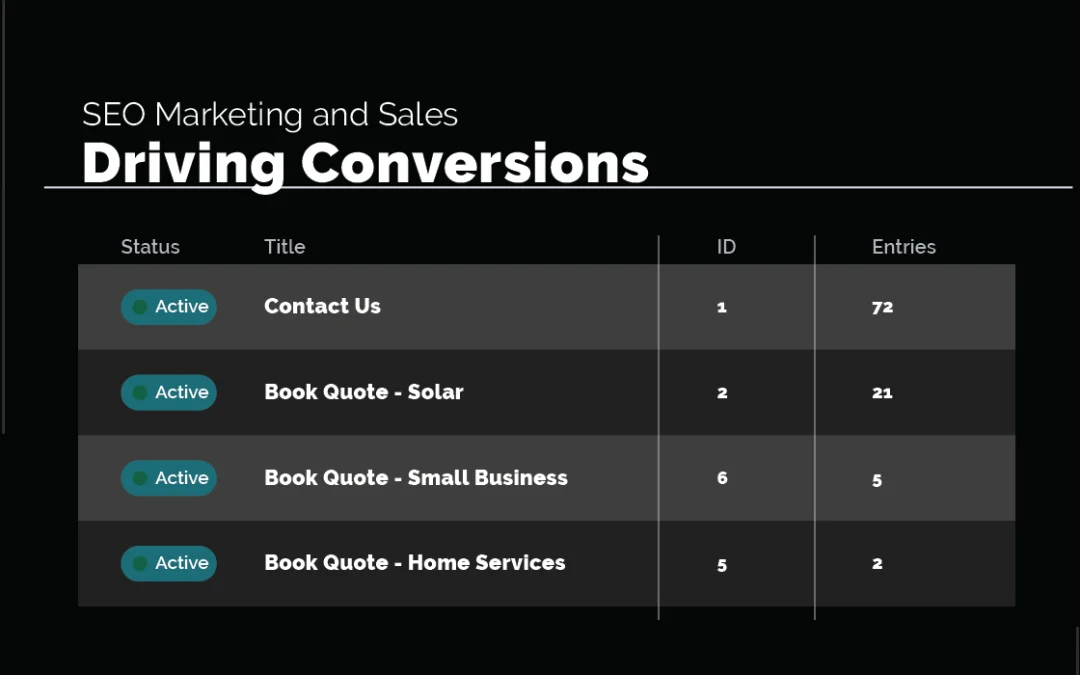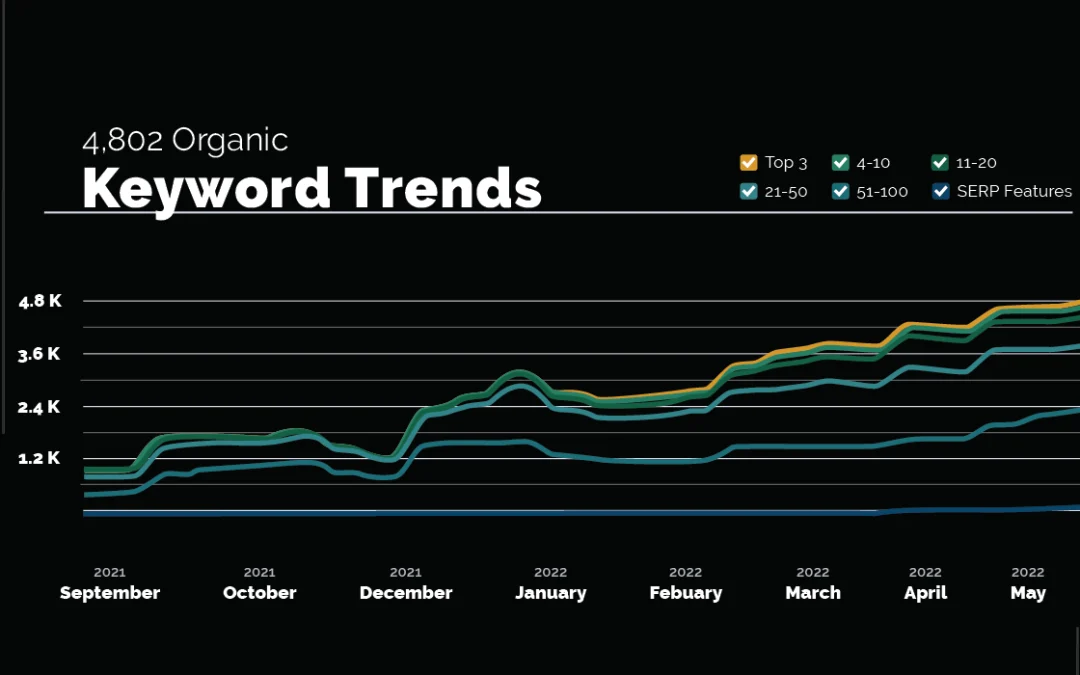Summary
- Targeting niche markets and using local SEO can help your small or medium-sized businesses compete with larger companies by focusing on customers with specialized needs, or who live in specific areas.
- Using long-tail keywords attracts more specific and less competitive web traffic, leading to better conversion rates.
- Creating high-quality content that offers a strong user experience establishes authority and improves engagement with your audience. Cultivating high-quality backlinks also creates authority by affiliating your brand with trusted sources of information.
- Using social media and encouraging user generated content also helps improve SEO efforts by turning your customers into advocates for your brand.
- Monitoring your analytics (and your competitors) is essential for improving your SEO strategy over time. For help with any of these tasks, reach out to our team at Monochrome Marketing.
In the digital realm, small and medium-sized businesses often find themselves pitted against industry giants. The big players have seemingly insurmountable advantages—huge marketing budgets, a dominant online presence, and tons of brand recognition. But SEO can help smaller businesses carve out their own space and thrive, even in spite of these factors.
Below, our SEO specialists at Monochrome Marketing arm you with actionable strategies to beat the big players and gain a competitive edge through targeted SEO tactics. Let’s get started!
See Also:
- Content Marketing Solutions for Small Businesses: Overcoming Common Challenges
- Scaling Up: Growth Strategies for Small Businesses
1. Identify & Target Niche Markets
Trying to be everything to everyone spreads you too thin. This is especially true for smaller organizations that can’t match the broad-based marketing strategies of larger companies. So finding and focusing on your niche markets—specialized areas with specific demands that are often underserved by larger corporations—helps you punch above your weight.
By becoming an authority in a particular niche, you can attract a dedicated audience that values your specialized knowledge and offerings. Try the following:
- Conduct surveys to understand customer needs in potential niches.
- Use Google Trends to identify emerging or stable niche markets.
- Implement audience segmentation on social media platforms.
- Validate the niche market with a minimum viable product (MVP) or pilot services.
See Also:
2. Optimize Long-Tail Keywords
Long-tail keywords are extended search query phrases that are highly specific. While they tend to bring in less traffic than shorter, more general keywords, they are significantly easier to rank for and often result in better conversion rates. This is because people using long-tail keywords are often closer to the point of purchase or are looking for a specific solution, making them more valuable to your business.
Try these tips to start making long-tail keywords work for your SEO efforts:
- Use keyword research tools like Semrush’s Keyword Magic Tool or Google Keyword Planner to discover long-tail keywords.
- Analyze competitors’ content for overlooked long-tail opportunities.
- Integrate these keywords naturally in website content, meta descriptions, and titles.
- Monitor the performance of long-tail keywords through analytics and adjust as needed.

3. Create High-Quality, Valuable Content
Quality content is the backbone of any SEO strategy. Beyond just getting people to your site, high-quality content keeps them there and converts them into customers.
As a smaller business, you have a key advantage here: you’re closer to your customers and have a deeper understanding of what they want. This puts you in an excellent position to create more personalized and valuable content that addresses your audience’s specific problems or questions. Try to:
- Identify the types of content that resonate with your audience (blogs, videos, webinars, etc.).
- Focus on solving problems or answering questions that are unique to your niche market.
- Use a mix of long-form and short-form content to cater to different audience preferences.
- Implement a content calendar to ensure consistent publishing and content quality.
See Also:
4. Local SEO for Geographical Advantage
If your business has a physical location or serves customers in a specific geographic area, local SEO is an absolute must. It focuses on optimizing your online presence to attract business from people who are searching for relevant products or services nearby. This is essential for small businesses trying to compete with larger brands who might not have as strong a presence in your local area.
Here are a few easy ways to start improving your local SEO now:
- Claim and optimize your Google My Business listing with accurate information and high-quality images.
- Encourage satisfied customers to leave reviews on Google and other review sites.
- Use local keywords in your website content, meta descriptions, and titles.
- List your business in local directories and keep the information consistent across platforms.
See Also:

5. Build a Strong Backlink Profile
Backlinks—links from other websites to yours—are considered votes of confidence by search engines and play a critical role in boosting your site’s authority. The quality of these backlinks often outweighs the quantity, making it crucial to focus on gaining links from reputable and relevant sources.
Unlike big corporations that may rely on their existing brand recognition to earn backlinks, smaller businesses often have to adopt a proactive approach. The following are all relatively easy ways to improve your backlink profile:
- Identify high-quality, niche-specific websites for potential backlinking.
- Create a pitch or offer value that would make it worthwhile for these sites to link to you.
- Utilize tools like Ahrefs to monitor your backlink profile and track new opportunities.
- Engage in guest posting on reputable platforms in your industry to gain authoritative backlinks.
6. Focus on User Experience (UX)
The user experience of your website doesn’t just affect your visitors; it also influences your search engine rankings. Google and other search engines are increasingly adjusting their algorithm to reward strong UX—meaning that a well-designed, fast, and mobile-responsive site can help you outperform bigger players who may not be as agile in updating or personalizing their massive websites.
Enhance your UX quickly with these approaches:
- Test your website speed using tools like Google PageSpeed Insights and optimize accordingly.
- Make your website mobile-responsive, as Google uses mobile-first indexing.
- Simplify navigation to help visitors find what they’re looking for easily.
- Conduct user testing to identify friction points in the user journey and resolve them.
7. Leverage Social Media & Brand Advocacy
The power of social media for driving traffic and improving SEO can’t be overstated. While you may not have the enormous ad budgets of larger competitors, you can very likely build a more tightly-knit community around your brand by connecting directly with your users.
User-generated content and brand advocacy can act as organic growth engines, bolstering both your social presence and SEO efforts. Here’s what to do:
- Identify which social platforms your target audience frequents and focus your efforts there.
- Create and share valuable content that encourages user engagement and sharing.
- Run social media campaigns that encourage user-generated content, such as reviews or photos of your product in use.
- Engage with your community regularly to foster brand loyalty and encourage advocacy.

8. Monitor & Analyze Competitors
Keeping tabs on larger competitors gives you insights into their strategies, from the keywords they target to the backlinks they’ve secured. This information can help you identify gaps in your own approach, giving you the opportunity to capitalize on areas they may be neglecting.
Here are a few quick tips to keep you in the know about your competition:
- Use tools like Semrush or Ahrefs to perform competitor analysis.
- Identify the keywords your competitors are ranking for and consider whether they are relevant to your business.
- Examine their backlink profile to find potential backlinking opportunities for your site.
- Analyze their content strategy to find gaps or opportunities for topics they haven’t covered but would be valuable for your audience.
See Also:
Working with Experts to Streamline Your SEO
Competing with larger companies might seem like a Herculean task, but with a focused and well-executed SEO strategy, even smaller businesses can perform miracles. The steps are clear and straightforward: identify your niche, optimize for long-tail keywords, create quality content, emphasize local SEO, build a strong backlink profile, prioritize user experience, leverage social media, and keep an eye on the competition.
By implementing these strategies and consistently refining your efforts, you can position yourself as a serious competitor to the big players in your industry. Get ready to take the battle to the giants, and feel free to contact our team for help with your quest—we’ve done this before, and we’ll be happy to show you the most efficient way to get results.









